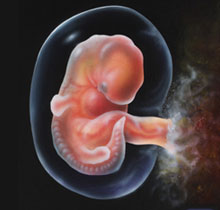If you are trying to conceive or have confirmed that you’re pregnant, it is obvious to have so many questions in mind. You may want to know about the earliest symptoms of pregnancy. You may also ask about how it feels during the first month of pregnancy.You will notice the symptoms of pregnancy in the first few weeks after conception, which could be anything from tender breasts and nausea to mood swings and dizziness. You may notice a change in your symptoms by the end of first month or by six weeks after your last period when your child has grown 10,000 times in size.

First Month of Pregnancy Symptoms
A missed period is usually the first symptom of pregnancy. In addition, you may also have the following symptoms.
1. Tender Breasts
Your breasts will start to look swollen and feel tender to touch. This happens due to hormonal changes that make your breasts feel heavier and fuller. You may want to buy a good maternity bra to alleviate the discomfort.
2. Morning Sickness
Morning sickness is common and it can strike you any time of the day or night. In some cases, you will have episodes of nausea with or without vomiting as early as three weeks after conception. Eat small portions and eat often to control your nausea.
3. Frequent Urination
Be ready to see a substantial increase in the number of bathroom visits. Frequent urination is one of the first pregnancy symptoms. This usually happens when your growing uterus exerts more pressure on your bladder. An increase in blood volume during pregnancy will also put your kidneys into overdrive.
4. Fatigue
Feeling tired is also a symptom you are more likely to experience during first month of pregnancy. The level of progesterone increases during early pregnancy, and this can make you feel sleepy.
5. Strong Reaction to Food
You will be amazed to notice that the food you once loved irritates you more than anything else does. Food cravings and food aversions are the outcome of hormonal changes.
6. Light Vaginal Bleeding
A small amount of vaginal bleeding or spotting shouldn’t worry you during the first month of pregnancy. Also known as implantation bleeding, it is usually the outcome of the fertilized egg attaching to the lining of your uterus. This usually happens after a couple of weeks of your conception.
7. Mood Swings
The increase in hormone, mainly progesterone, will make you feel weepy and emotional.
8. Other Symptoms
You will also notice some additional symptoms such as dizziness, cramping and constipation. During pregnancy, your blood vessels will dilate which lowers your blood pressure and makes you feel dizzy. Similarly, hormonal changes will slow down your digestive system, which can lead to constipation.
Baby Growth During First Month of Pregnancy
You count weeks of pregnancy from the first day of your last period. It implies that you’re not actually pregnant during the first couple of weeks of conception. Your fertilized egg will move towards the womb during the third week. It travels through fallopian tube and divide repeatedly. It will become a mass of over 100 cells when it finally reaches the womb. It burrows into the lining of your womb and completes implantation.
By the end of first month, the embryo will grow and its outer cells will form a link with your blood supply. The inner cells will first form a couple of layers. Each of these layers will grow and form different parts of your baby’s body. The embryo attaches itself to a tiny yolk sac to get nourishment until the placenta forms in the next few weeks.
Here’s a video about the development of a baby during first month of pregnancy.
Tips for First Month of Pregnancy: Healthier Baby and Mom
If it’s the first time you get pregnant, you will be new to so many things. Here are a few tips to help you stay safe:
- Book an appointment with your midwife and tell them about your medical history. They will share how to look after yourself while you’re pregnant. Ask them about any exercise you can do safely.
- Start taking a daily folic acid supplement to provide your baby with enough protection from spinal cord and brain related problems. Take at least 400 mcg of folic acid daily.
- Avoid alcohol during pregnancy and never smoke because it increases your risk for ectopic pregnancy and miscarriage. It is also a good idea to limit your intake of caffeine and don’t take more than 200 mg of caffeine a day.
- Stick to a balanced diet to ensure that you provide your baby with all-important nutrients. It is a good idea to avoid certain foods such as unpasteurized dairy products, cheeses, undercooked eggs and raw shellfish.
- It is normal to experience mild abdominal cramps, but you should go see your midwife if you notice blood with cramping.
- Take plenty of rest and avoid stress during the first month of pregnancy. Go to bed early, at least one night a week, and relax your nerves with music, reading or something that you enjoy and can safely do.
- Handle household chemicals and other cleaning products carefully and always wear gloves. Don’t use products with strong fumes and keep windows open when doing chores.
